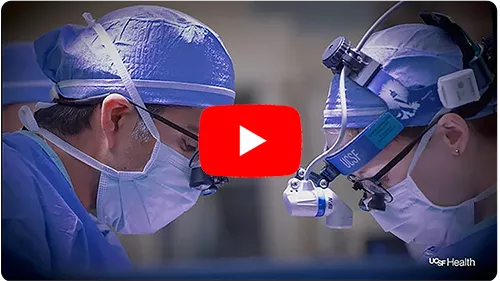Why UCSF for Cancer Surgery?
Why UCSF for Cancer Surgery?
Day in the Life of a UCSF Oncology Surgeon: Dr. Ajay Maker
Follow along on a surgery day with UCSF Department of Surgery's Chief of Surgical Oncology Division, Dr. Ajay Maker as he cares for a patient with colon and subsequent liver cancer tumors through surgery and implantation of a hepatic artery infusion pump. Along the way, Dr. Maker shares why he became a doctor, how he prepares for surgery, the importance of family and more.
Leading Center of Excellence
The UCSF Medical Center and UCSF Helen Diller Family Comprehensive Cancer Center are premier hospitals, each ranking among the top ten (10) in their respective classes according to the the well-regarded U.S. News & World Report annual survey. UCSF, a leading cancer referral center, offers a wide array of surgical options that are often not available in a community setting.
Expertise in Complex Cases
Cancer surgeons at UCSF are known for their willingness to treat high-risk cancer patients including those routinely turned down for surgery at other institutions. Patients frequently seek second opinions from our surgeons, who are also physician-scientists testing the latest treatments in clinical trials.
Multidisciplinary Approach
Patients receive seamless multidisciplinary care from the beginning of their treatment at UCSF. Working collaboratively, surgeons, medical oncologists, and radiation oncologists develop highly individualized treatment plans supported by state-of-the-art imaging and pathology services, nurses, and other health professionals.
Comprehensive State-of-the-Art Pain Management
UCSF's Pain Management Team provides 24/7, around-the-clock post-surgical pain management including epidural anesthesia, a state-of-the-art approach available at UCSF, but not at every hospital.
Minimally Invasive Surgery
UCSF surgeons were among those who helped pioneer minimally invasive gastrointestinal cancer surgery, also known as laparoscopic surgery. Unlike a traditional open procedure which uses large incisions, surgeons make three small 1-inch incisions and insert a laparoscope, a lighted tube and video camera, and operate using miniaturized specially manufactured surgical instruments.The camera transmits images of the operative field back to a computer monitor, guiding the surgeons as they manipulate the instruments. The advantages of minimally invasive surgery are:
- Less post-operative pain
- Reduced risk of Infection
- Shorter hospital stays
- More rapid return to normal activities
Although less invasive, these surgeries are complex and intricate, and require a high level of expertise. At UCSF, surgeons perform a high volume of laparoscopic gastrointestinal procedures.
The Latest in Surgical Innovation
- Microwave ablation of unresectable liver tumors
- Arterial infusion chemotherapy
- Liver-sparing surgical techniques
Clinical Trials
UCSF offers patients access to a broad menu of clinical trials for the most promising new therapies. Our physicians are members of the leading cooperative groups including Cancer and Leukemia Group B (CALGB), the American College of Surgeons Oncology Group (ACOSOG), Society of Interventional Radiology (SIR), and the Radiation Therapy Oncology Group (RTOG) and often serve as Principal or Co-Investigators on important studies.
Tumor Board Conference
The tumor board plays a critical role in multidisciplinary cancer care at UCSF. At a tumor board conference, complex and difficult cases are reviewed by the entire team of health professionals.
Low Operative Mortality and Fewer Complications
The Surgical Oncology Program is a high volume referral center for Northern California and the Western U.S. Published studies demonstrate that cancer patients who have their surgery performed at high volume medical centers have lower death rates and fewer complications.

